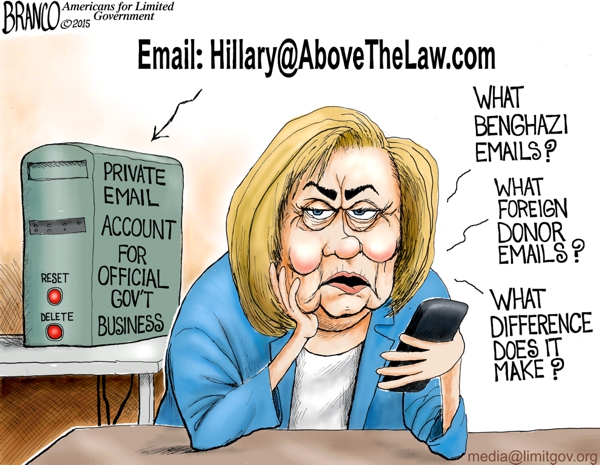By Natalia Castro
White House Press Secretary Josh Earnest reminded Americans on Sept. 3, 2015 that “the success of our democracy depends on rule of law. And there is no public official that is above the rule of law. Certainly not the President of the United States.”
However, almost a year later and a potential federal indictment continues to loom over the presumptive Democratic presidential nominee, former Secretary of State Hillary Clinton, over her housing classified information on her private email server. In the meantime, most of her staff, herself, and her fellow Democrats are treating the issue as if she possesses immunity.
Clinton is accused of having violated 18 U.S. Code § 1924(a), entitled, “Unauthorized removal and retention of classified documents or material,” which states “Whoever, being an officer, employee, contractor, or consultant of the United States, and, by virtue of his office, employment, position, or contract, becomes possessed of documents or materials containing classified information of the United States, knowingly removes such documents or materials without authority and with the intent to retain such documents or materials at an unauthorized location shall be fined under this title or imprisoned for not more than one year, or both.”
Clinton has tried to frame this as a situation in which she was simply negligent of the rules and standards, but the latest Wikileaks released email raises very serious question. Clinton appears to have knowingly removed these documents, in an email on June 17, 2011, when she directed one of her staffer to “turn into non paper w no identifying heading and send nonsecure.”
The email was discussing confidential information and a broken secure fax machine. Rather than finding a more secure method, Clinton directs illegal activity for her convenience.
Clinton might have won the Democratic primaries in most states, but she could be completely unprepared for the FBI primary which she will be battling next.
In the month leading up to the release of this latest piece of email evidence, the FBI and the State department have become highly critical. In a May 2016 Department of State Inspector General report, the State Department highlights how Clinton’s actions are clear breaches in policy and security, and recommends accountability.
The report notes “the use of non-departmental systems creates significant security risks. Department policies have evolved considerably over the past two decades; but since 1996, the FAM and FAH have contained numerous provisions regulating the use of such outside systems.”
So, not only did Clinton apparently break the law, but her private email serve may have put our nation at risk. Now, the FBI must hold themselves to the rule of law which is known to be so integral to our democracy, but even President Obama seems to be working against them.
The Department of Justice has already granted partial immunity to Bryan Pagliano, who assisted in setting up Clinton’s email servers. The department is also allowing for Pagliano to delay his testimony despite clear evidence which his attorneys say “will inevitably cover matters that might furnish a link in the chain of evidence needed to prosecute,” according to the Washington Post on June 7.
But the executive mishandling of the case continues up the line, as evidence mounts against Clinton which could lead to indictment, that has delayed the release of emails and downplayed the significance of this security threat. A Freedom of Information Act request on releasing some of the emails will not be complete until November 31 according to the State Department — after the elections are over.
Meanwhile, Democrats in power are stepping up to support Clinton, despite the clear case against her, so now it is in the FBI’s hands and a decision must be made. The FBI cannot continue this train of protection simply because of Clinton’s status.
While indicting a major party’s nominee for a breach of classified information would be unprecedented, neglecting an indictment simply sets the undesirable precedent that the rule of law can be dismissed out of political consideration, making the use of executive power to complete any illegal act acceptable.
Even Clinton challenger Bernie Sanders knows this is an awful idea to put in place, as Politico writers Edward-Isaac Dovere and Gabriel Debenedetti explain, while Clinton appears to have won the nomination, a likely reason Sanders won’t step down is because of the likelihood of an indictment before the convention.
A pre-convention indictment could result in Clinton losing major support from Democrats who are backing her simply because she is expected to win — it would be the ultimate proof that Clinton cannot be trusted. The Democrats would have no choice but to select Sanders (or somebody else) as their nominee simply because the revolutionist is better than the criminal campaigning from a court room.
The FBI has the evidence to indict Clinton on the classified information on a private email server scandal, and they cannot continue neglecting the rule of law simply because of her high establishment status or political considerations. Whether she is able to continue as the Democratic nominee with the new evidence released is a major political question, but it is not the FBI’s to be asking, their job is to simply enforce the law which Clinton is breaking.
Natalia Castro is a contributing editor at Americans for Limited Government.








